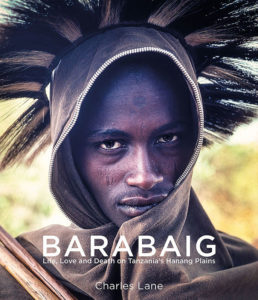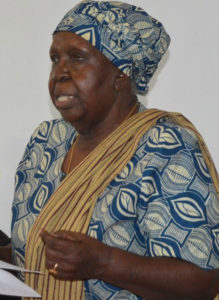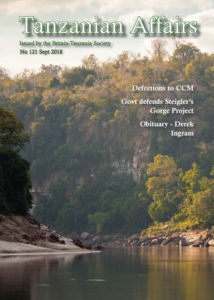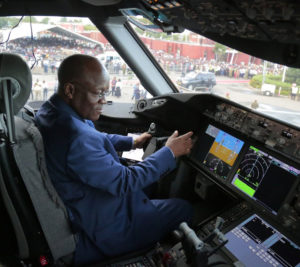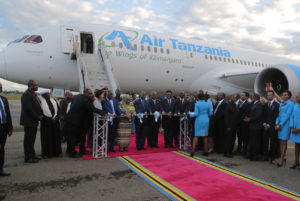by Donovan McGrath
How To Get Women To Trust The Police? ‘Gender’ Desks
(National Public Radio – USA) Extract: How do you get a woman to report to the police that she’s been assaulted or abused if she doesn’t trust the police to take action? That, says activist Jamila Juma, is a serious problem in Zanzibar. Juma is the executive director of the Zanzibar Female Lawyers Association (ZAFELA) … “[Some police officers] don’t understand about rape or they think it’s a women’s issue, so they don’t care,” Juma says… The police agree with her. “Gender-based violence is persistent in Zanzibar but women are not confident in reporting these issues,” says deputy sergeant Mauwa Saleh … Today, over 400 police stations across Tanzania have Police Gender and Children’s Desks, including seven of Zanzibar’s 20 police stations… The gender desks initiative was first proposed in 2009 by the Tanzanian Police Female Network (TPFNet), a professional association formed in 2007 that aims to improve the way the police relate to women in the community… Statistics illustrate the need for these desks. Nearly half of Tanzanian women under the age of 50 say they have been physically or sexually assaulted … The desks aim to make both special handling and privacy available to victims of gender-based violence… (15 August 2018)
UK aid minister hails ‘double win’ of heroin crackdown in Tanzania
(Guardian.com – UK) Extract: British border agents and the Royal Marines have stopped millions of pounds worth of heroin trade across the western Indian Ocean, where the drug is being transported from Afghanistan to east Africa for eventual sale in Europe. The international development secretary, Penny Mordaunt, said the anti-smuggling scheme in Tanzania, funded from the UK’s aid budget, was vital for development in the nation but would also protect the UK and Europe from the effects of organised crime… “This is a win for Tanzania as we tackle the drivers of instability and poverty which hold back development, but also a win for the UK as we are tackling criminal networks that work in both countries and stopping drugs and organised crime coming to our shores,” she said. The Department for International Development estimates that 40% of the heroin being sent across the west Indian Ocean is destined for Tanzania … Since the early 2000s there has been a significant rise in organised criminal groups smuggling Afghan heroin through ports along the Swahili coast from Pakistan and Iran. Most of the drug ends up in Europe, though development officials say an increasing amount is sold directly on the streets of Dar es Salaam and Zanzibar… (Accessed 6 December 2018)
As Tanzania’s LGBT fear for their lives, HIV will thrive
(CNN – USA) In one day, everything changed. Extract continues: … “Since the announcement was made, things got worse,” said the 23-year-old trans woman from Tanzania, who asked to remain anonymous out of fear for her safety… The announcement that she says changed her life was made by powerful politician Paul Makonda, regional governor of Dar es Salaam, Tanzania’s largest city… [H]e vowed to set up a task force to round up and arrest people suspected of being gay… Makonda’s call for all gay people to be reported to him initiated a chain reaction in the country, forcing many into hiding… People already faced a 30-year jail sentence in Tanzania for gay male sex, a holdover from colonial-era laws, mirroring severe penalties for same sex relationships across many African countries… Under the administration of President John Magufuli, rights groups believe, the situation has gotten worse, with the closure of LGBT-friendly clinics and the prohibition of community organizations that do HIV outreach … But the prospect of a civilian task force scouring the streets and giving civilians the power to report people brought a new level of terror… Those unable to flee are instead pushed underground and into hiding, kept from entering the outside world – which blocks their access to health services, such as those protecting against HIV/AIDS… (1 December 2018)
Journalist released from detention in Tanzania
(CNN – USA) Extract: Two Committee Protect Journalists staffers have been released from detention in Tanzania and have left the country … Extract continues: Angela Quintal and Muthoki Mumo were permitted to return to their hotel in Dar es Salaam after being taken to an unknown location and subjected to “several hours of questioning,” according to a news release. Their passports were also returned. “Angela Quintal and Muthoki Mumo travelled to Tanzania to understand the challenges facing the Tanzanian press and to inform the global public,” Committee to Protect Journalists executive director Joel Simon said in a statement. “It is deeply ironic that through their unjustified and abusive detention of our colleagues, Tanzanian authorities have made their work that much easier. It is now abundantly clear to anyone who followed the latest developments that Tanzanian journalists work in a climate of fear of intimidation. We call on the government of Tanzania to allow journalists to work freely and to allow those who defend their rights to access the country without interference.” … (8 November 2018)
Amnesty International condemns Tanzania’s ‘attack’ on family planning
(CNN – Lagos, Nigeria) Tanzania’s government directive to suspend family planning commercials in the country has generated concerns about birth control policies in the country. Extract continues: The government … contacted agencies funded by the United States Agency for International Development (USAID) that are involved in birth control projects and told them to stop running any family planning content in the media, a directive that rights group Amnesty International called an attack on the sexual and reproductive health of people in the East African country… But a health ministry official told CNN the decision was to “restructure and review” media advertisements on birth control… “We are reviewing these adverts, some of them are outdated. Most of the messages are not catering for the new generation,” [Ahmad Makuwani, director of reproductive and child health in the ministry, said]… (25 September 2018)
Why is once-peaceful Tanzania detaining journalists, arresting schoolgirls and killing opposition leaders?
(Washington Post – USA) Extract: … Tanzanian politics has been making international headlines. Journalists representing the Committee to Protect Journalists were detained in Dar es Salaam … The government expelled pregnant girls from school. Paul Makonda, the regional commissioner for Dar, announced plans to round up LGBT people. Eventually, the rest of the government distanced itself from Makonda, but the damage was done… What’s going on? … How have things become so repressive so quickly? The answer lies in the 2015 election of John Magufuli as president. Since then, opposition politicians have been arrested, harassed and beaten. TV offices have been raided and newspapers suspended. Regime critics – journalists, business executives, opposition politicians, student leaders – have been kidnapped, forced into exile or assassinated by “unknown assailants.” … Much of this violence has been kept quiet because it has been local… The government has shied away from open repression, which could lead to losing international aid and moderate voters’ support. Through local officials, Magufuli can use violence – while still being able to distance himself from an “unruly local official” when necessary… (30 November 2018)

